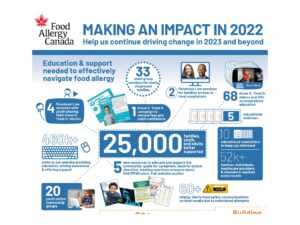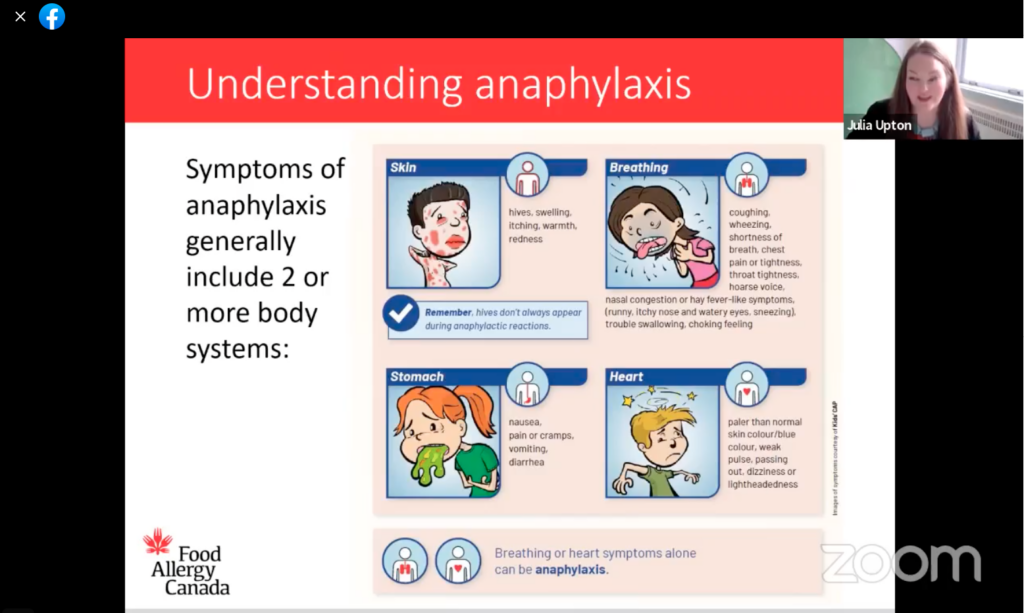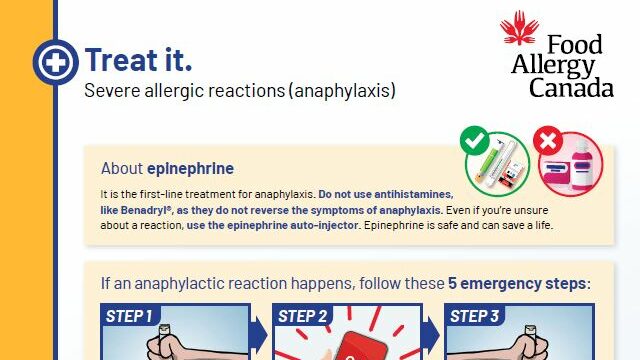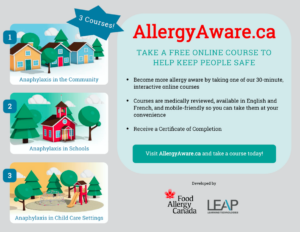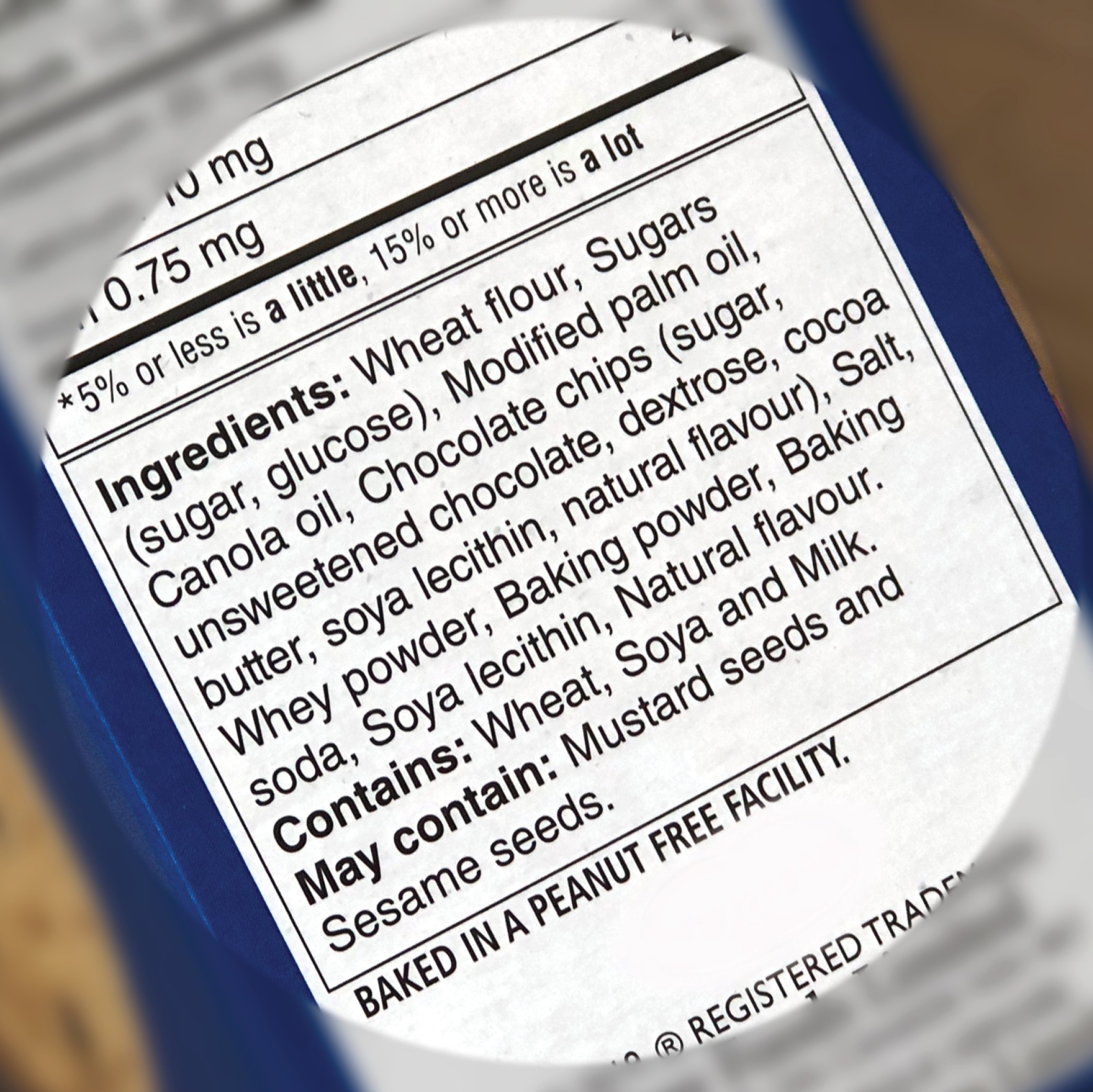Check out our 2022 year in review, find out how your donations are helping us to create a better #FoodAllergyFuture, and learn how you can support our goals this year. Take our webinar survey and tell us what topics you want to hear more about this year. Register for our upcoming sessions, including a webinar on the development and prevention of cow’s milk allergy in infancy, and the winter session of Allergy Pals/Allies online mentorship program for youth aged 7-15. Plus find out about our 2023 community awards and apply or nominate others. Read our reminders for a safe new year, including steps to take after reacting to a food that you thought was safe.
2022 year in review – thanks for your support!
It has been another busy year of providing educational programming and advocating on your behalf. Read about some of our key accomplishments and the positive impacts made with your support. Plus, find out how you can help us continue making transformational change and donate now. We’re able to do our important work because of you!
2022 accomplishments
Empowered Canadians to recognize and treat anaphylaxis
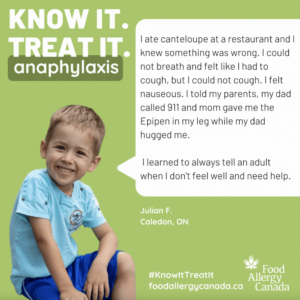
With our Know it. Treat it. campaign, webinars, and educational content on anaphylaxis management, we are helping to take the fear out of anaphylaxis and instill confidence around treatment. We also launched a national campaign during Food Allergy Awareness Month to ensure everyone across the country knows how to recognize and treat anaphylaxis with over 49 million views!
Goal for this year: Continue driving awareness and education with our Know it. Treat it campaign to ensure Canadians know how to recognize anaphylaxis and promptly treat it with epinephrine.
Provided evidence-based education and support at diagnosis and during critical life transitions
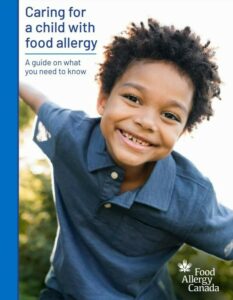
We have increased the confidence on managing food allergy in over 25,000 families and youth by empowering them through webinars with medical experts, and with new content-rich resources, like the care guide.
Goals for this year: Continue providing Canadians with robust educational programming, resources, and support, particularly during critical life stages, like when newly diagnosed, starting school, leaving home, and more. We will also focus on translating our critical resources into different languages to ensure all Canadians have access.
Increased awareness of the seriousness of food allergy and how to support those impacted
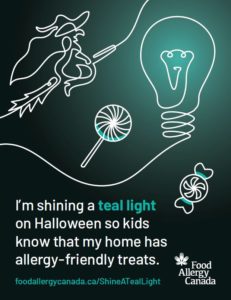
We ensured Halloween was inclusive for all kids with our #ShineATealLight campaign that had over 71 million views across Canada.
We helped to make schools safer with over 200,000 AllergyAware.ca course completions since launch, ensuring teachers, school staff and others are more educated on food allergy and anaphylaxis.
We educated over 15,000 healthcare professionals on food allergy and anaphylaxis management through our direct mail and email efforts, and conferences.
Goals for this year: Educate future generations on the seriousness of food allergy through a national school program that is curriculum-linked and developed to normalize food allergy, increase empathy, and build community skills around anaphylaxis management. We will also continue to educate and drive awareness across the country with targeted campaigns, and through conferences.
Helped to improve quality of life by being your national voice on key issues
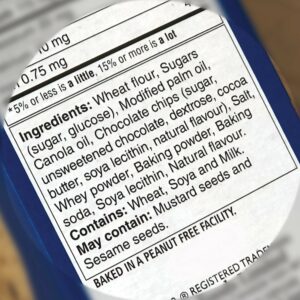
We continued our advocacy on making “may contain” meaningful to help ensure all Canadians know what is in their food. We advocated for access to allergy care in Newfoundland and Labrador, and we helped to address gaps in the labelling of natural health products, and with food products sold online.
Goals this year: Continue our initiatives to address “may contain” labelling with food manufacturing, and continue our collaborations with industry, government, and other key stakeholders. We will also continue to raise the issue and advocate for greater clarity and transparency on ingredient information in online food and non-food products, ensuring you can make safe, informed choices, and continue with our efforts for greater access to care.
Learn more about our key accomplishments in our 2022 impact in numbers and donate today.
Discover how donations from the community helped us make an impact this year in our 2022 impact in numbers illustration. Be a part of our donor community and donate today to help us continue to #MakeFoodAllergyCount.
Survey: Tell us which topics you want featured in our webinar series
Have your say! We want to know what food allergy-related topics you are most interested in learning more about this year. Your feedback will help inform our 2023 educational webinar programming priorities.

Do you wish there was a topic on ingredient labelling and “may contain” statements, want to better understand FPIES or EoE, want to learn more about anaphylaxis and why epinephrine is first-line treatment, interested in how you can empower your child or teen on managing confidently? Let us know! Plus, you have the opportunity to include topics that are of most interest to you if you don’t see it in our list.
Your feedback is instrumental in helping us serve you better! Please take a few minutes to complete our short survey.
Be sure to visit foodallergycanada.ca/events to register for upcoming webinars throughout the year.
New webinar Feb. 9th, 2023: Cow’s milk allergy: A closer look at development and prevention in infancy

What the webinar is about: This webinar is targeted to expectant and new parents, dietitians, nurses and healthcare professionals who provide pre-natal and post-natal support to hear the latest evidence on the prevention of cow’s milk allergy. It will cover:
- Current guidance recommended by the Canadian Paediatric Society (CPS) and the Canadian Society of Allergy and Clinical Immunology (CSACI) for preventing food allergy in babies
- Insight from the latest studies on increased risk of cow’s milk allergy from intermittent supplementation with cow’s milk formula, and on the importance of keeping allergenic foods in the baby’s diet regularly to maintain tolerance
- Practical strategies for cow’s milk protein introduction

A Q&A will follow where you can ask questions, and you can submit your questions upon registration.
Who is speaking: Dr. Edmond Chan, a Pediatric Allergist at the BC Children’s Hospital (BCCH) Allergy Clinic, UBC Clinical Professor, Clinical Investigator at BCCH Research Institute, and Head of the BCCH Division of Allergy & Immunology, where he leads a food allergy research program. He is a co-author of several national/international guidelines on food allergy, including the CPS’ position statement on dietary exposures and allergy prevention in high-risk infants. Dr. Chan is Vice President of the CSACI, on the Executive of the CPS’ Allergy Section, and on Food Allergy Canada’s Healthcare Advisory Board, and steering committee for Canada’s National Food Allergy Action Plan.
When is the webinar: Thursday, February 9, 2023 from 12 pm to 1 pm EST.
Register now: Allergy Pals/Allies winter session for kids 7-15
The free 8-week online mentorship program begins soon on January 29! Sign up your 7-15-year-old now, so they don’t miss out on an amazing experience connecting with other children living with food allergy.
These online sessions are fun, engaging and have received outstanding feedback from previous participants. Watch the video below to learn how this program works, and how it impacted Benjamin’s life. Register your child today to save their spot!
“What I love about Allergy Pals is learning how to deal with tough situations, like with chefs, friends, sometimes bullies or even family. Using role-playing they taught us how to deal with those situations. Allergy Pals has totally made me feel better about my allergies.”
Benjamin, past Allergy Pals participant
Applications now open: Our 2023 Community Awards
Enter to win or nominate others for our awards/grants! Learn more about them below and discover last year’s inspiring winners. Apply early and please share with others who may be eligible. All applications close April 3, 2023.
Pryde Family Grant

For graduate students, medical students, and healthcare professionals with an interest in food allergy/anaphylaxis. The Pryde Family Grant offers two grants valued at $500 each to help cover the costs of attending an academic program or event related to food allergy. Read about last year’s recipients, Alyssa Burrows and Andrew Thompson.

Robyn Allen Leadership Award
For a healthcare professional, industry representative, government representative, or an individual who has exemplified extraordinary leadership and dedication in the advancement of food allergy awareness and education. Read about last year’s recipient, Dr. Julia Upton.

Sabrina Shannon Memorial Award
For students entering their first year or continuing their studies at a post-secondary institution. Students can apply for a chance to receive one of two awards valued at $1,000 each. Applicants do not need to have food allergies to be eligible for the award. Read about last year’s recipients, Maeve Gillis and Aliegha Dixon.
Helpful reminders for a safe 2023
The new year is well underway, and we’re ready to help you manage your food allergy with confidence. Refresh your food allergy and anaphylaxis knowledge with our resources below and share with others. Plus, find out what to do if you have an allergic reaction to a food that was supposed to be safe.
Epinephrine first and the role of Benadryl® in anaphylaxis
Find out why epinephrine is the first-line treatment for anaphylaxis, and what role, if any, antihistamines have during a reaction. You’ll build your confidence in learning how to recognize anaphylaxis and what to do in case you or someone you know experiences it.
How to use epinephrine auto-injectors
Watch these videos in English or French to learn how to use the different auto-injectors in Canada, including EpiPen®, ALLERJECT® and Emerade™ for treating anaphylaxis. You’ll gain a better understanding of the device options and their administration techniques.
Treating reactions resource sheet
Learn about the 5 emergency steps to follow when someone is having an anaphylactic reaction in this visual and easy-to-understand resource.
Real allergic reaction stories from youth
In this video, you’ll learn how to recognize the signs and symptoms of anaphylaxis, the importance of using your epinephrine auto-injector, and hear empowering reaction stories from youth and their lessons learned.
AllergyAware.ca free online courses
Learn the basics of food allergy and anaphylaxis, how to prevent reactions from happening, and if they do happen, how to recognize and treat them.
Steps to take after reacting to a food that you thought was safe

Whether you have a food allergy or buy for someone who does, it’s so important to read the labels of pre-packaged foods every time to decide if products are safe to eat. Yet, there are cases when an allergic reaction happens with a food that was thought to be safe according to the label.
If you’ve had an allergic reaction to a product that you believe contained a priority food allergen, but it was not listed on the ingredient list, follow these steps:
- Save a sample of the product and its packaging, or any unopened product with the same lot number.
- Contact the Canadian Food Inspection Agency (CFIA) through their online form or other service channels. Your submission will be referred to an inspector for follow up.
- Keep a record of all your correspondence with the CFIA, including emails and calls. For calls, note the date/time, name of the person you spoke to, and what they said.
- Send a copy of your final email correspondence with the CFIA to info@foodallergycanada.ca for our records.
- Contact the food manufacturer who produced the product to report the incident; it’s essential they know and take this matter seriously. You can also request a follow-up call once they have investigated the matter.
- Contact your allergist for follow-up on your allergic reaction.
While Canada has good food allergen labelling laws, sometimes errors can occur and it’s important to report incidents to the CFIA so that appropriate measures can be taken.
Learn more
Sign up for our Allergy Alerts safety service which includes food recalls, allergen changes from food manufacturers, labelling updates, and more. You can count on our Allergy Alerts service to ensure you are kept informed on food safety issues that impact you.
Watch a video from a member of our community as she discusses her experience reporting a reaction
Find more resources and tools at foodallergycanada.ca/resources, and check out more videos at foodallergycanada.ca/videos.
Tags: Allergy Pals, CFIA, community awards, latest news, webinar

